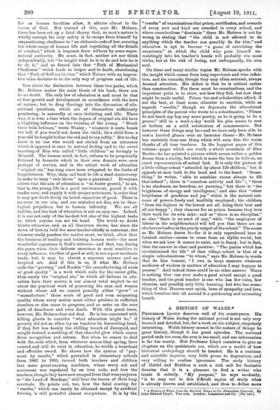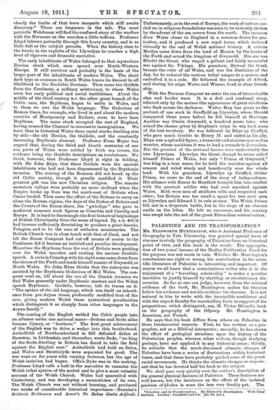A HISTORY OF WALES.*
PROFESSOR LLOYD deserves well of his countrymen. His history of Wales during the national period is not only very learned and detailed, but, for a work on the subject, singularly interesting. Welsh history cannot in the nature of things be great history, though it has great episodes. The national period ends too soon, the area is too small, and our information is far too scanty. But Professor Lloyd contrives to give us chapters on the prehistoric era, which are a model of how historical embryology should be treated. He is a cautious and scientific inquirer, very little prone to dogmatism, and very willing to confess ignorance. The early history of Goidel and Brython is such a rich soil for fantastic theories that it is a pleasure to find a writer who treats it soberly. "My purpose," he says modestly; "is to map out in this difficult region of study whit* is already known and established, and thus to define more • A History of Wales from the Earliest Times to the Edwardian Conquest. By John Edward Lloyd. Two vols. London: Loans and Co. [21s. net.] clearly the limits of that terra incognita which still awaits discovery." There are longueurs in the tale. The most patriotic Welshman will find the confused story of the warfare with the Normans on the marches a little tedious. Professor Lloyd labours patiently through this heavy country, and is as little dull as the subject permits. When the history rises to the heroic in the exploits of the Llywelyns he reaches a high level of vigorous and dramatic narrative.
The early inhabitants of Wales belonged to that mysterious Iberian stock which once spread over North-Western Europe. It still survives and probably is the basis of the larger part of the inhabitants of modern Wales. The short dark type so common in South Wales traces its descent in all likelihood to the Neolithic Iberians. Then came the Goidels from the Continent, a military aristocracy, to whom Wales owes her early political and social institutions. About the middle of the third century B.C. the other great branch of the Celtic race, the Brythons, began to settle in Wales, and to them we owe the Welsh language. The Ordovices of Roman times, for example, who lived in and about the modern counties of Montgomery and Radnor, seem to have been Brythons. The same stock occupied the rest of England, having crossed the Channel in successive immigrations. We have thus in historical Wales three racial stocks dwelling side by side—the old Iberian, the Goidelic, and the constantly increasing Brythonic element. Professor Kuno Meyer has argued that, during the third and fourth centuries of our era, parts of Wales were settled by Irish sea rovers, his evidence being the Goidelic inscriptions on tombstones. We think, however, that Professor Lloyd is right in holding, with Sir John Rhys, that these Goidels were the ancient inhabitants who had not been dispossessed by the Brythonic invasion. The coming of the Romans did not break up the old Celtic society, though it greatly modified it. Their greatest gift was the new Christian religion. The remote mountain valleys were probably no more civilized when the Empire broke up than was the south-east of Britain when Omar landed. Then came the effort of the Britons to carry on alone the Roman regime, the days of the Dukes of Britain and the Counts of the Saxon shore, the " gwledigs " who gave to mediaeval romance such figures as Cunedda and Ceredig and Emrya. It is hard to disentangle the first historical beginnings of British Christianity from the mass of legend. By A.D. 400 it had become sufficiently flourishing to produce a great heretic, Pelagius, and to be the care of orthodox missionaries. The British Church was in close touch with that of Gaul, and not till the Saxon Conquest had cut off means of access to the Continent did it become an isolated and peculiar development. Meantime the Brythons from the rest of Britain were pushing over the Welsh marches and ousting the ancient Goidelic speech. A certain Cunedag with his eight sons came down from the shores of the Forth and made himself master of Gwynedd, or North Wales. Sir John Rhys thinks that the enterprise was assisted by the Brythonic Ordovices of Mid Wales. The con- quest went on, till about the eve of the Danish invasion we find Wales generally under Brythonic masters and the Welsh speech Brythonic. Goidelic, however, left its traces on it. " The syntax of the old language, which was itself an inherit- ance from pre-Aryan times, profoundly modified that of the new, giving modern Welsh those syntactical peculiarities which distinguish it so sharply from other languages in the Aryan family."
The coming of the English welded the Celtic people into an alliance under one national name—Britons and Scots alike became Cymry, or " brothers." The first great achievement of the English was to drive a wedge into this brotherhood. Aethelfrith of Northumberland in 603 defeated Aidan at Dawston, in Liddesdale, and thereafter, wrote Bede, " no king of the Scots dwelling in Britain has dared to take the field against the English race." .Aethelfrith laid hold on Deira, and Wales and Strathclyde were separated for good. The war went on for years with varying fortunes, but the age of Welsh isolation had begun. Offa's Dyke was in the making. Professor Lloyd calls a halt in the narrative to examine the Welsh tribal system of the period and to give a most valuable account of the Welsh Church. Wales had quarrelled with Canterbury, and was developing a monasticism of its own. The Welsh Church was not without learning, and produced two works of considerable historical importance—Nennius's ilistoria Brittonum and Asser's De _Rebus Gestis AeUredi. Unfortunately, as in the rest of Europe, the work of culture car- ried on in religions foundations was soon to be violently shaken by the advent of the sea rovers from the north. The invasion drew Wales closer to England in a common desire for pro- tection, and it produced a new royal house which endured virtually to the end of Welsh national history. A certain Merfyn came down from the land of Manaw by the banks of the Forth and seized the kingdom of Gwynedd. His son was Rhodri the Great, who waged a gallant and fairly successful war against the Vikings. His grandson, Hyweal the Good, became the ruler of all Wales, and was the Justinian of the day, for he reduced the various tribal usages to a system and embodied it in a code. He followed the example of Alfred, and during his reign Wales and Wessex lived in close friend- ship.
With the Norman Conquest we enter the era of interminable elan and border wars. It is a dull and confused story, relieved only by the meteor-like appearance of great chieftains who flash across the darkness. Walter Map has given us the portrait of one such in Graffydd ap Llywelyn, whom Harold conquered three years before he fell himself at Hastings. Another was Owain Gwynedd, a hundred years later, who seized the chance given by Stephen's reign to win back some of the lost territory. He was followed by Rhys ap Gruffyd, who gave much trouble to Henry II. and ended as his ally. Rhys was a splendid figure, a humorist and statesman as wellas warrior, whose ambition it was to lead a crusade to Jerusalem. But the greatest of the national heroes were undoubtedly the two Llywelyns. Llywelyn the Great, though he never called himself Prince of Wales, but only " Prince of Gwynedd," was king in a true sense, for he held the marches against all comers and ruled wisely and beneficently over the whole land. With his grandson, Llywelyn ap Gruffyd, titular Prince, we come to the end of the story of independence. His alliance with Simon de Montfort brought him into conflict with the greatest soldier who had ever marched against Wales. Both were men of stubborn wills and respected each other; but Britain was too small a space for two such men as Llywelyn. and Edward I. to rule at once. The Welsh Prince fell, not in a desperate battle, but in the siege of an obscure castle on the Irfon. He left no successor, and his country was swept into the net of the great Edwardian centralization.



































 Previous page
Previous page